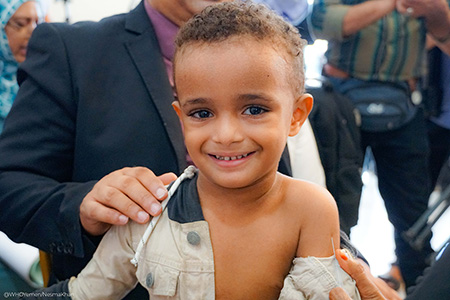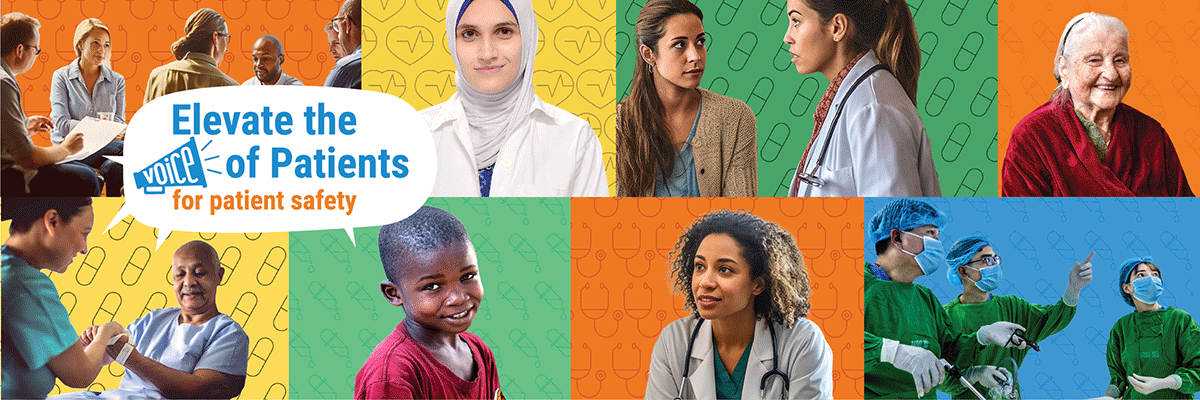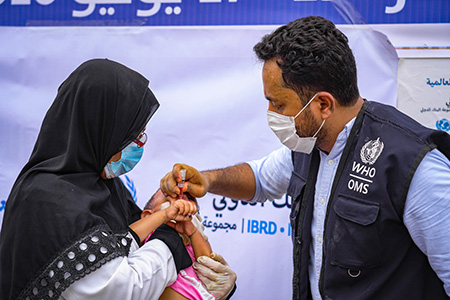Millions of people in Yemen face the trauma and socioeconomic pressures of 9 years of conflict with limited services
 10 October 2023, Sana’a, Yemen – While some health issues are evident, others remain unseen. The focus of health actors on risks that lead directly to death has kept the attention away from mental health risks. Yet mental health conditions have severe consequences for communities.
10 October 2023, Sana’a, Yemen – While some health issues are evident, others remain unseen. The focus of health actors on risks that lead directly to death has kept the attention away from mental health risks. Yet mental health conditions have severe consequences for communities.
The need for mental health and psychosocial support is rapidly increasing. People in Yemen are suffering from trauma and problems exacerbated by violence, displacement, unemployment, hunger and poverty. Such health needs remain among the most culturally stigmatized and least prioritized. The Yemen Humanitarian Needs Overview 2023 indicates that only 120 000 of the 7 million people reported to require mental health treatment and support have uninterrupted access to these services.
“The country’s pre- and post-conflict health system struggles to integrate mental health services into the public health structure. It is also unable to provide adequate support or obtain thorough data owing to cultural stigma,” said Dr Arturo Pesigan, WHO Representative in Yemen. “The community, on the other hand, especially adults and elderly people, have increasing needs yet are faced with unavailable services and social rejection.”
A study on mental health conditions among Yemen’s population was carried out in 2019 by EPOS Consulting and Health Services, with the support of the European Commission and in partnership with Yemen’s Ministry of Public Health and Population. This study, which represented 42% of the Yemeni population, found that post-traumatic stress disorder was the mental health condition with the highest rate of prevalence (45%) among Yemen’s people. This was followed by depression (27%), anxiety (25%), schizophrenia (18%) and phobia (4%).
These rates are met with limited to no access to specialized services, and limited social acceptance of the conditions, especially in hard-to-reach areas and groups. People are left to handle their trauma on their own. This includes women, children and other vulnerable groups.
In regard to children, the ongoing interrupted access to quality education remains a concern in terms of the cognitive and emotional development, as well as mental health, of 10.76 million school-aged girls and boys in Yemen.
In 2022, the Ministry of Public Health and Population, with support from WHO, finalized the National Mental Health Strategy (NMHS) 2022–2026. NMHS supports the development and integration of curative and preventive mental health services that will ensure comprehensive access for all. Since then, WHO has supported the establishment and rehabilitation of 47 mental health units, across many of Yemen’s governorates, to ensure the availability of safe services for communities.
For more information visit: Yemen Health Emergency
Media contacts: WHO Yemen Communications:
About WHO: Since 1948, the World Health Organization (WHO) has been the United Nations agency dedicated to advancing health for all, so that everyone, everywhere can attain the highest level of health. WHO leads global efforts to expand universal health coverage, direct and coordinate the world’s responses to health emergencies and connect nations, partners and people to promote health, keep the world safe and serve the vulnerable.
WHO and UNICEF collaborate on emergency integrated measles and rubella vaccination campaign in 13 governorates in Yemen
 23 September 2023, Aden, Yemen – The Ministry of Public Health and Population in Aden, in collaboration with the United Nations Children’s Fund (UNICEF) and World Health Organization (WHO), is set to implement a measles-rubella, vitamin A and COVID-19 integrated vaccination campaign. This joint effort aims to combat the ongoing outbreaks and spread of measles and rubella in Yemen.
23 September 2023, Aden, Yemen – The Ministry of Public Health and Population in Aden, in collaboration with the United Nations Children’s Fund (UNICEF) and World Health Organization (WHO), is set to implement a measles-rubella, vitamin A and COVID-19 integrated vaccination campaign. This joint effort aims to combat the ongoing outbreaks and spread of measles and rubella in Yemen.
The 6-day integrated measles and rubella vaccination campaign kicked off on the morning of Saturday 23 September 2023 and will target 1 267 082 children aged 6 to 59 months across 121 districts in 13 governorates. The campaign will integrate COVID-19 vaccinations for the high-priority group in fixed and temporary fixed sites. A total of 3025 medical teams, consisting of 847 fixed teams and 2178 mobile teams, will be deployed for a minimum of 6 days.
Dr Arturo Pesigan, WHO Representative in Yemen, and Peter Hawkins, UNICEF Representative to Yemen, expressed their commitment to this joint effort. Dr Pesigan stated, “Our commitment to Yemen’s children is unwavering, and we stand united with the government to strengthen the immunization programme as a cornerstone of primary health care on our path to achieving universal health coverage.”
WHO Yemen and UNICEF Yemen are working closely with the Government of Yemen, partners and communities to guarantee the success of this integrated effort. By bringing together their efforts and resources, WHO and UNICEF strive to enhance vaccine coverage, protect vulnerable communities and prevent future outbreaks of infectious diseases.
Peter Hawkins, UNICEF Representative to Yemen, warned: “Measles can kill, but vaccinating children against measles will save their lives. The vaccine is safe and is effective”. Hawkins continued to call upon everyone to “join in and make sure that every child between 6 months and 5 years of age is vaccinated”.
The campaign is made possible with the generous support of Gavi, the Vaccine Alliance; the United States Agency for International Development; and the World Bank. Their assistance enables UNICEF Yemen, WHO Yemen and the Government of Yemen to strengthen routine immunization, reduce the number of zero-dose children, protect vulnerable populations and prevent future outbreaks of these diseases.]
This campaign’s integration of measles and rubella vaccines and vitamin A supplementation with COVID-19 vaccinations shows a comprehensive approach to public health. By tackling numerous diseases at the same time, the campaign aims to optimize its impact and contribute to Yemen’s general health and well-being.
About UNICEF
UNICEF works in some of the world’s toughest places, to reach the world’s most disadvantaged children. Across more than 190 countries and territories, we work for every child, everywhere, to build a better world for everyone. For more information about UNICEF and its work for children, visit the UNICEF Yemen website.
About WHO
WHO works worldwide to promote health, keep the world safe, and serve the vulnerable. Our goal is to ensure that a billion more people have universal health coverage, to protect a billion more people from health emergencies, and provide a further billion people with better health and well-being. For more information, visit the WHO Yemen website.
For more information, please contact:
Shatha Al-Eryani, WHO Yemen,
Kamal Al-Wazizah, UNICEF Yemen,
World Patient Safety Day 2023: "Engaging Patients for Patient Safety" takes center stage in Yemen

17 September 2023, Yemen — Patient safety is an intrinsic element of healthcare quality, and its significance cannot be overstated. Unsafe healthcare practices can lead to severe consequences for patients, resulting in increased morbidity and mortality rates. In low- and middle-income countries, 134 million adverse events occur each year due to unsafe care in hospitals, contributing to 2.6 million deaths annually. Globally one out of ten patients experience harm in primary and ambulatory settings, with more than 50% of this harm being preventable.
The theme for World Patient Safety Day 2023 is "Engaging Patients for Patient Safety." This theme highlights the pivotal role that patients, families, and caregivers play in ensuring healthcare safety.
In Yemen, the World Health Organization is committed to aligning with global initiatives on Patient Safety Day. This alignment will be achieved through advocacy efforts targeting policymakers, hospital overseers, and healthcare practitioners. Within the context of a weakened health system and limited access to health care services due to more than eight years of conflict, WHO aims to shed light on the detrimental consequences of unsafe care, highlight international patient safety goals, and emphasize the critical roles played by healthcare providers and patients in elevating patient safety.
"Patient safety stands as a paramount determinant of healthcare quality. Evidence demonstrates that when patients are actively involved in their care as partners, it leads to significant improvements in safety, patient satisfaction, and health outcomes. By becoming active members of the healthcare team, patients can contribute to the safety of their care and the overall healthcare system. WHO is committed to redoubling its efforts in Yemen to ensure the provision of safe healthcare, empower patients, and engage with their families and caregivers. Together, we can make a profound difference in patient safety for all Yemeni families," Dr Arturo Pesigan, WHO Representative in Yemen.
To mark World Patient Safety Day, WHO in Yemen will collaborate on the following activities:
An inaugural event will be taking place at the University of Aden’s medical college with participation from senior health officials and focal points in Yemen’s Ministry of Public Health and Population, health care workers, hospital managers, and heads of governorate health offices and district health offices. Representatives from nongovernmental organizations are also invited to participate, recognizing their important role in advancing the patient safety agenda. This event will feature interventions from quality and patient safety experts, as well as technical experts from WHO’s Yemen country office.
Hospital-Based Awareness Sessions: 14 hospitals across 14 governorates will host dedicated awareness sessions, engaging key decision-makers, hospital management, and healthcare professionals.
Distribution of Educational Material: Patient safety posters and checklists emphasizing safe childbirth and surgical protocols will be printed and disseminated across affiliated hospitals.
Join us on World Patient Safety Day as we work together to elevate patient safety in Yemen and worldwide. We believe that every second counts, and together, we can save lives through improved patient safety.
For more information:
WHO concerned over increase in measles and rubella cases among children in Yemen
 31 August 2023—The World Health Organization (WHO) is concerned over increasing cases of measles and rubella among children in Yemen. As of 31 July this year, the number of suspected cases of measles and rubella in Yemen has reached almost 34,300 cases and 413 deaths, compared to 27,000 cases and 220 associated deaths in 2022. There is also limited information on the outbreak’s impact on pregnant women who remain at high risk.
31 August 2023—The World Health Organization (WHO) is concerned over increasing cases of measles and rubella among children in Yemen. As of 31 July this year, the number of suspected cases of measles and rubella in Yemen has reached almost 34,300 cases and 413 deaths, compared to 27,000 cases and 220 associated deaths in 2022. There is also limited information on the outbreak’s impact on pregnant women who remain at high risk.
“Ideally, the outbreak response vaccination campaign should target at least all children under the age of ten to be comprehensive and effective; however, the current funding gap has eroded support and limited the target to children under five years of age—the group with higher mortality rates,” said Dr Arturo Pesigan, WHO Representative in Yemen.
The increase in measles and rubella cases among children in Yemen this year is occurring within a context of economic decline and low incomes, displacement, and overcrowded living conditions in camps, coupled with an overwhelmed health system, low immunization rates, and a large number of children who remain unreachable through routine immunization interventions. According to the WHO-UNICEF National Immunization Coverage Estimate for 2022, 27 percent of children under one year of age in Yemen are unvaccinated for measles and rubella and have not met the minimal set of vaccines for full protection.
WHO is working with the Yemeni Ministry of Public Health and Population (MoPHP) and partners to increase support for routine vaccination interventions. WHO also continues to work within the National Health Framework to provide technical and financial support to improve coverage among children. In 2022, WHO supported the protection of around 913,000 children from measles and rubella. As of July 2023, MoPHP with the support of WHO and other partners reached a coverage rate of around 65 percent of all children—both doses of measles and rubella (MR1 and MR2). A measles-rubella vaccination campaign, targeting 1.2 million children under the age of five, is planned to be implemented in September this year.
For more information visit: Yemen Health Emergency
Media contacts: WHO Yemen Communications,
Note to editors
About the Expanded Programme on Immunization (EPI) in Yemen: Yemen’s Expanded Programme on Immunization started in 1974 and aims to reduce the incidence rates of maternal and neonatal tetanus, ensure full immunization of children under one year of age, and extend all new vaccines and preventative health interventions to children in all districts, reducing the number of deaths associated with vaccine-preventable diseases.
Various childhood disease vaccines have been introduced since then, and currently, immunization against diphtheria, pertussis, tetanus, poliomyelitis, measles, pneumococcal, hepatitis B, diarrhea, pneumonia, and tuberculosis is available to every child to be protected against vaccine-preventable diseases. Similarly, a surveillance system was established to report, investigate, and respond to any outbreak related to vaccine-preventable diseases in Yemen’s Expanded Programme on Immunization.
About WHO: Since 1948, The World Health Organization (WHO) has been the United Nations agency dedicated to advancing health for all, so that everyone, everywhere can attain the highest level of health. WHO leads global efforts to expand universal health coverage, direct and coordinate the world’s responses to health emergencies and connect nations, partners and people to promote health, keep the world safe and serve the vulnerable.








